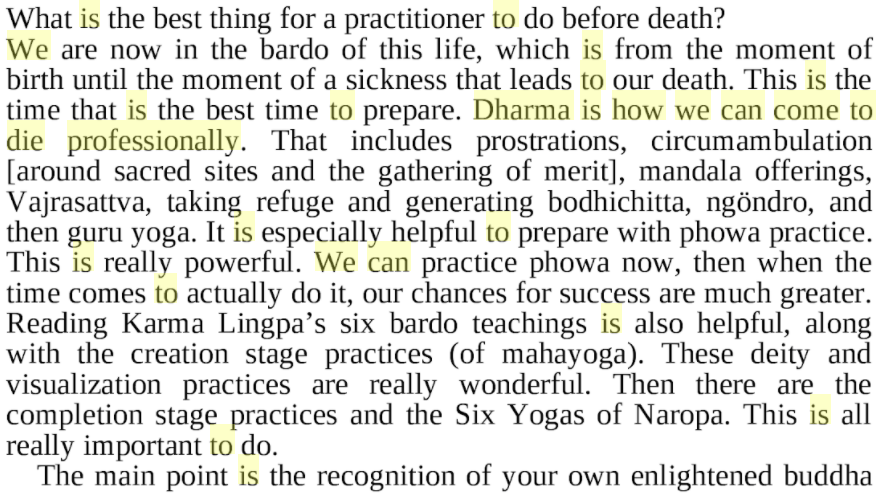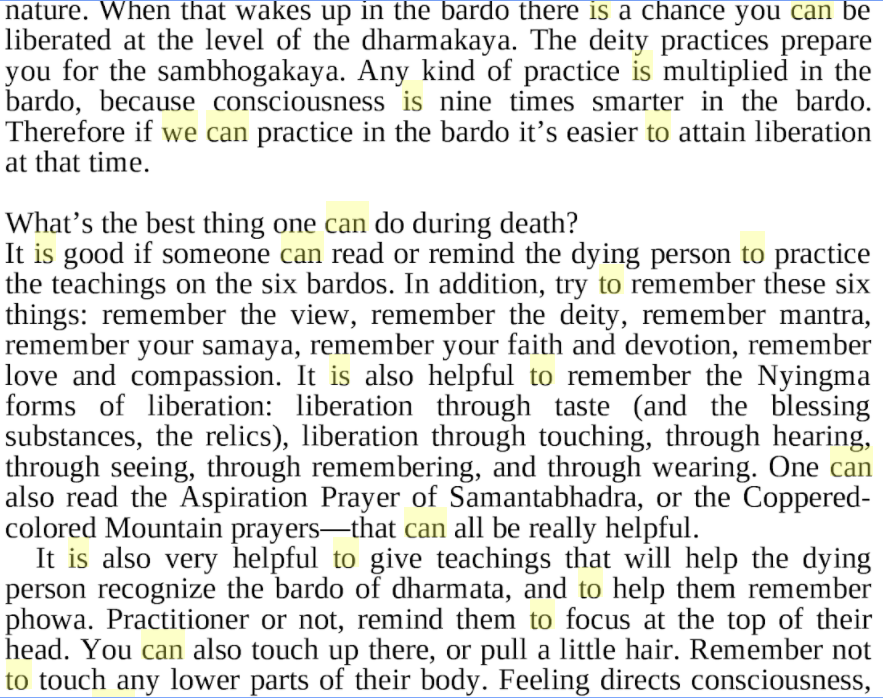Lama Zopa Rinpoche gives a similar account and has this to say - How to be a Real Professional:
On the importance of familiarizing ourselves with the fact of death
By meditating on impermanence, death, not only that death is going to
happen at some time, but especially that the time of death is
uncertain, by making the mind familiar with that you always have this
mindfulness of impermanence, death, that this lifespan is very short.
So instead of thinking, “I’m going to live very long,” that concept of
permanence that “I’m going to live for a very long time” that rises
even on the same day that you’re going to die, the same day that
you’re going to have a car accident, or airplane crash or heart attack
or whatever, a situation in which one is going to die. Even on the day
that one is going to die this concept that “I’m going to live for many
years” is there in the morning when you get up. It’s there even five
minutes before your heart attack, before you die. Just five minutes
before the car accident in which one is going to die, this concept
that “I’m going to live for many years” is there. So it's not true, it
cheats, it's defeating. It blocks, it hinders you from thinking of
Dharma. From your side you have to make preparation for a free death,
for a happy death. [This thought of permanence] blocks you from making
preparations for a good rebirth in your next life, so that right after
this life you have a good rebirth, are born in the pure land of the
Buddha where you can become enlightened, become a great bodhisattva.
To have a happier life or a better rebirth with more opportunity to
practice Dharma, to meet the teachings of the Buddha. Even just simply
to have a good rebirth, a happy life - it blocks you from making
preparation for that by practicing Dharma, and it blocks you from
practicing Dharma to actualize the path, to cease the delusions, karma
and from liberating yourself from the oceans of samsaric suffering,
from achieving ultimate happiness. It blocks that. It blocks you from
actualizing bodhicitta, from having realizations of the Mahayana path,
it blocks you from achieving enlightenment, it blocks oneself from
enlightening numberless other sentient beings, to liberate them from
the oceans of samsaric suffering, and bring them to full
enlightenment. So it’s not true. That concept is not true. It deceives
you, it cheats you, if you believe in that. Then suddenly one day,
death comes.
Our death is coming
Rinpoche goes on to give several examples of people recently passing away that were well known to the audience. In general, Rinpoche is giving an outline about how Buddhist practioners of the Mayahana train to think about death and the surety and finality of it. It is said that the only thing that can help us at that moment of death is Dharma. Dharma is the ultimate refuge for Buddhists at the moment of death. It is the only thing which will subdue the terror and fright that can come to ordinary beings at the moment of their own death.
He continues...
Then one day it becomes one’s own turn. Then others one day, sooner or
later, hear your name with the word ‘dead’, ‘died’ joined after your
name. For example, let’s say Zopa. After the name ‘Zopa’, then add the
word ‘died.’ So up to now we hear about others, but sooner or later
others will hear your name joined with the word ‘died.’ So sooner or
later, that definitely happens. Sooner or later, one day, dead -
daytime or nighttime, one day that happens. You want to go shopping
for food for this week, and then death happens, you are unable to
return back home. Death happens like that. Or you’re cooking food and
before you put it on the plate to eat it, death happens. Or you start
to write a letter, and before it is finished, death happened. Or you
start to write a book, then before finishing the book, death happens.
You go traveling, on pilgrimage or vacation, then death happens before
coming back. Even while one starts to eat food, before finishing the
food on the plate, the soup in the bowl, before finishing that death
happens. You go to the bathroom, but before returning back to your
room, death happens. So it’s definite that one day you’ll be doing
something, and death will happen. It’s for sure. That day is going to
come sooner or later. One day your body will be called ‘corpse.’
Corpse. Even normal family members, very close friends, they will not
come near or they won't touch it. Our body will be covered with cloth.
One’s own body, this body will be on the fire. They will see the
skull, see some part of the bones. Or the body will be in the coffin
buried in the ground, the graveyard, some flowers put around, and your
family members crying, the loved one's family members crying. There’s
nothing that can be done - you know that you’re going to die now. Now
death is happening, and you know that you’re going to leave, you’re
going to separate, you have no choice, there's nothing you can do. No
choice, you have to separate from all these loved ones, family,
friends, you have to separate from them. And from all these
possessions, Mercedes car or limousine. Whatever possessions you have,
you know that everything has to be left. At that time the only thing
that can help is Dharma, if you practiced Dharma in life.
How for a Buddhist only Dharma can help us at this time
So how can Dharma help us at this time?
That helps, the virtue. How much good heart you practiced in daily
life, it helps at that time. How much patience you practiced in daily
life, it helps at that time. How much kindness you practiced to
others, it helps at that time. Dharma is the only thing which at that
time can help you not to suffer, to have a happy mind. For the best
practitioner of Dharma, they experience unbelievable happiness, joy at
the time of death. They can go to a pure land where one can become
enlightened. By being born there, then one develops attainment, then
one is able to offer deep benefit to other sentient beings, to
reincarnate with free will, with total freedom to come back into the
world only to benefit sentient beings, to come back with total freedom
into the suffering world to liberate beings. As it’s mentioned in
Liberation in the Palm of Your Hand, you are so happy, for example as
if you haven’t met your parents for so many years and are now so happy
to be meeting your parents. Or as if you are going for a holiday after
working so hard for so long without a holiday and now you are going
for holiday, so are incredibly happy. For the best Dharma
practitioner, that's the happiness they experience at the time of
death. Then the middle Dharma practitioner's death is full of
confidence in the heart, when you die there is full confidence that
you will have a good rebirth. Full confidence and a happy mind. For
the last one, the lowest Dharma practitioner’s death, there is no
fear, even though it is not clear where one is going to reincarnate,
still there’s no fear that you will be reborn in the lower realms.
So professionalism? Well, the Dharma is inner professionalism. Here is how Rinpoche describes it:
So without this inner professionalism, the inner profession of the
healthy mind, the pure mind which is Dharma, the real Dharma, so
without this, no matter how much you’re externally professional, life
problems go on more and more.
And what is inner professionalism as opposed to external professionalism?
... if they are missing the inner profession then what is missing is
mentally how to live life, how to do everything. The real profession
is missing. That is the positive attitude, living life with this
peaceful, happy, healthy mind, non-ignorance, non-anger,
non-attachment, and especially with the thought of cherishing others,
the ultimate good heart, the thought of cherishing others, unstained
by the self-cherishing thought, the selfish mind.
So I think Lama Tharchin is exactly right: Dharma is how we can come to die professionally.


